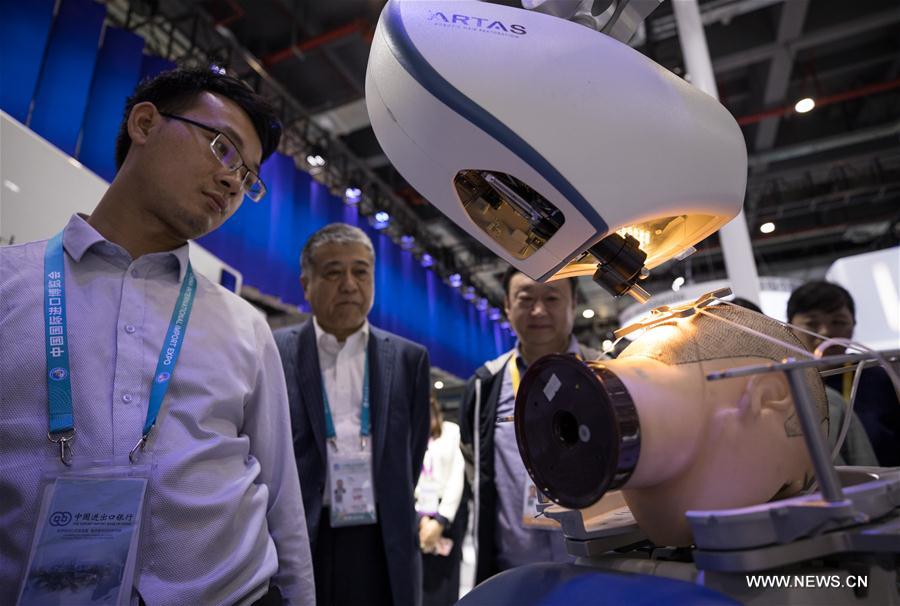A glimpse of global AI industry at China import expo
 0 Comment(s)
0 Comment(s) Print
Print E-mail Xinhua, November 9, 2019
E-mail Xinhua, November 9, 2019

Garbage sorting robot, "nutritional diet" for tomatoes, wearable health devices -- a future with artificial intelligence can be seen and touched at the ongoing second China International Import Expo (CIIE) in Shanghai.
When visiting Shanghai for the first time, where strict garbage sorting policies are being newly enforced, one could feel a bit lost and embarrassed while holding wrappers or empty cups in hands, not knowing which waste container to throw them into. However, any sorting questions one may have could be answered by a garbage sorting robot at the booth of ABB, a Swiss digital technology giant.
Various items of garbage were carried to a black box where the well-designed AI algorithms identify their shapes and locate their positions within 100 milliseconds with an accuracy of 98 to 100 percent. Afterward, a collaborative robot will drop them into proper waste bins.
With a wider application and faster calculation, the system will be soon put into use in seafood processing factories and is hoped to be applied in material sorting and quality inspection in the future, said Liu Qianjin, country technology officer with ABB China.
"The next climax of AI development lies in manufacturing," he said, adding that compared to the consumer-oriented AI industry which has been well developed, intelligent manufacturing is in its infancy and requires more advanced technology as well as deeper cooperation between global innovators.
From manufacturing to agriculture, medical treatment to daily travel, the transformation AI is bringing to the world is on full display at the expo.
At a booth twice the size of last year, Japanese electronics manufacturer Omron Corporation built a smart greenhouse to show how tomatoes were taken good care of by its "Sensing&Control + Think" system, which has been installed in an intelligent agricultural garden in eastern China's Wuxi City.
"We have developed closer and more direct communication with our Chinese partners from last year's expo," said Tsutomu Igaki, executive officer of Omron. "As a first-class international expo, the CIIE embodied the strong purchasing power of China as the world's second-largest economy. "
To make future healthcare more visible and accessible to visitors, Electa, an international medical firm from Sweden, showcased a live teleconsultation supported by AI and 5G, connecting doctors from five different hospitals.
It took only 10 minutes with a 90 percent precision rate for AI to draw a sketch for the nasopharyngeal cancer target region that a senior doctor would need at least two to three hours to complete.
"AI is a good helper that can free doctors from tedious and exhausting work, so that we can serve our patients better," said Sun Ying, one of the doctors who participated in the teleconsultation, and the leader of the research team that developed the AI sketching system in cooperation with computer scientists and medical firms including Electa.
Gong Anming, executive vice president of Electa's Region China, said Electa was seeking deeper collaboration with Chinese hospitals and AI innovators to promote new techniques applied in clinical use.
AstraZeneca, another medical big name, announced at the expo that it would upgrade its Shanghai R&D platform to a global R&D center and establish an AI innovation center.
A 12-lead wearable electrocardiograph device is one of the showcased medical technologies at AstraZeneca's booth. With AI-assisted diagnosis system, it can monitor patients' condition outside of the hospital and alert in real-time to prevent myocardial ischemia.
"China has become AstraZeneca's second-largest market and a crucial platform for growth, playing an increasingly important role in our global innovation strategy," Pascal Soriot, chief executive officer of AstraZeneca, said at an AI forum at the CIIE.
"We are honored to be an exhibitor of CIIE for the second consecutive year. We hope to share our vision for healthcare and promote an interconnected medical innovation ecosystem at this open platform for communication," he added.






Go to Forum >>0 Comment(s)